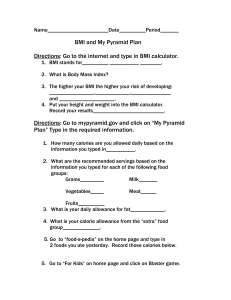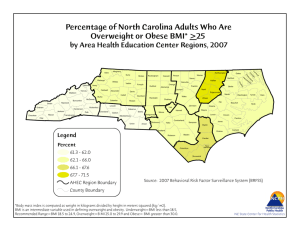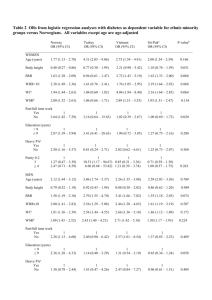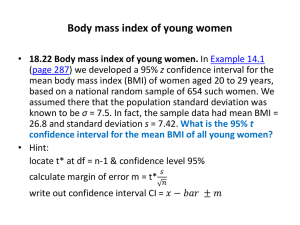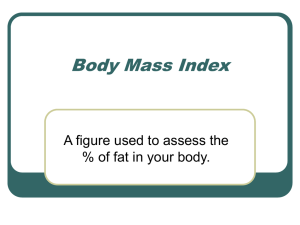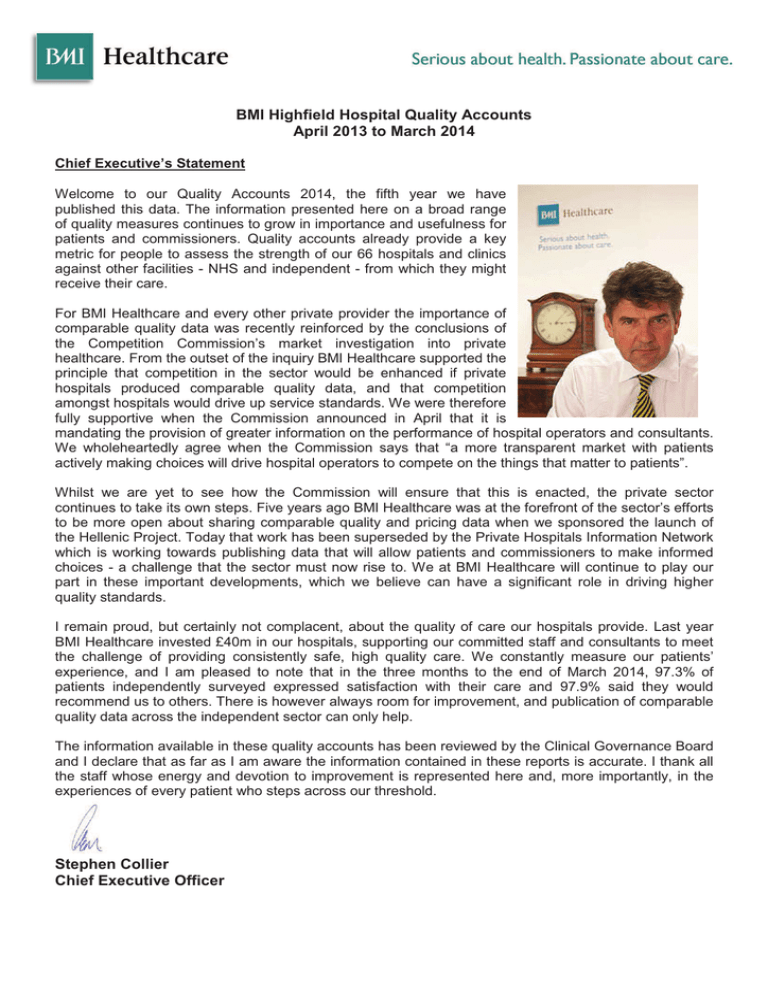
BMI Highfield Hospital Quality Accounts
April 2013 to March 2014
Chief Executive’s Statement
Welcome to our Quality Accounts 2014, the fifth year we have
published this data. The information presented here on a broad range
of quality measures continues to grow in importance and usefulness for
patients and commissioners. Quality accounts already provide a key
metric for people to assess the strength of our 66 hospitals and clinics
against other facilities - NHS and independent - from which they might
receive their care.
For BMI Healthcare and every other private provider the importance of
comparable quality data was recently reinforced by the conclusions of
the Competition Commission’s market investigation into private
healthcare. From the outset of the inquiry BMI Healthcare supported the
principle that competition in the sector would be enhanced if private
hospitals produced comparable quality data, and that competition
amongst hospitals would drive up service standards. We were therefore
fully supportive when the Commission announced in April that it is
mandating the provision of greater information on the performance of hospital operators and consultants.
We wholeheartedly agree when the Commission says that “a more transparent market with patients
actively making choices will drive hospital operators to compete on the things that matter to patients”.
Whilst we are yet to see how the Commission will ensure that this is enacted, the private sector
continues to take its own steps. Five years ago BMI Healthcare was at the forefront of the sector’s efforts
to be more open about sharing comparable quality and pricing data when we sponsored the launch of
the Hellenic Project. Today that work has been superseded by the Private Hospitals Information Network
which is working towards publishing data that will allow patients and commissioners to make informed
choices - a challenge that the sector must now rise to. We at BMI Healthcare will continue to play our
part in these important developments, which we believe can have a significant role in driving higher
quality standards.
I remain proud, but certainly not complacent, about the quality of care our hospitals provide. Last year
BMI Healthcare invested £40m in our hospitals, supporting our committed staff and consultants to meet
the challenge of providing consistently safe, high quality care. We constantly measure our patients’
experience, and I am pleased to note that in the three months to the end of March 2014, 97.3% of
patients independently surveyed expressed satisfaction with their care and 97.9% said they would
recommend us to others. There is however always room for improvement, and publication of comparable
quality data across the independent sector can only help.
The information available in these quality accounts has been reviewed by the Clinical Governance Board
and I declare that as far as I am aware the information contained in these reports is accurate. I thank all
the staff whose energy and devotion to improvement is represented here and, more importantly, in the
experiences of every patient who steps across our threshold.
Stephen Collier
Chief Executive Officer
Hospital Information
BMI The Highfield Hospital is part of BMI Healthcare, Britain's leading provider of independent
healthcare with a nationwide network of hospitals & clinics performing more complex surgery
than any other private healthcare provider in the country. Our commitment is to quality and
value, providing facilities for advanced surgical procedures together with friendly, professional
care.
BMI The Highfield Hospital has 47 beds with all rooms offering the privacy and comfort of ensuite facilities, satellite TV and telephone. The hospital has four theatres and 2 extended
recovery beds. These facilities combined with the latest in technology and on-site support
services; enable our consultants to undertake a wide range of procedures from routine
investigations to complex surgery. This specialist expertise is supported by caring and
professional medical staff, with dedicated nursing teams and Resident Medical Officers on duty
24 hours a day, providing care within a friendly and comfortable environment.
The Highfield Hospital provides treatment for anybody aged over 16 years but the majority of
people who use the services are aged over 50 years. Approximately 65% of people receive
NHS treatments and 35% receive private treatments.
BMI Healthcare is registered as a provider with the Care Quality Commission (CQC) under the
Health & Social Care Act 2008. BMI Highfield Hospital is registered as a location for the
following regulated services:•
•
•
•
Treatment of disease, disorder and injury
Surgical procedures
Diagnostic and screening
Family Planning
The CQC carried out an unannounced inspection on May 2nd 2013 inspecting the hospital on
five domains, issuing full compliance with all five:
9
Respecting and involving people who use
9
9
Care and welfare of people who use services
9
Supporting workers
9
Assessing and monitoring the quality of service
provision
Safeguarding people who use services from
abuse
BMI The Highfield Hospital has a local framework through which clinical effectiveness, clinical
incidents and clinical quality is monitored and analysed. Where appropriate, action is taken to
continuously improve the quality of care. This is through the work of a multidisciplinary group
and the Medical Advisory Committee.
Regional Clinical Quality Assurance Groups monitor and analyse trends and ensure that the
quality improvements are operationalised.
At corporate level the Clinical Governance Board has an overview and provides the strategic
leadership for corporate learning and quality improvement.
There has been ongoing focus on robust reporting of all incidents, near misses and outcomes.
Data quality has been improved by ongoing training and database improvements. New reporting
modules have increased the speed at which reports are available and the range of fields for
analysis. This ensures the availability of information for effective clinical governance with
implementation of appropriate actions to prevent recurrences in order to improve quality and
safety for patients, visitors and staff.
At present we provide full, standardised information to the NHS, including coding of procedures,
diagnoses and co-morbidities and PROMs for NHS patients.There are additional external
reporting requirements for CQC, Public Health England (Previously HPA) CCGs and Insurers
BMI is a founding member of the Private Healthcare Information Network (PHIN) UK – where
we produce a data set of all patient episodes approaching HES-equivalency and submit this to
PHIN for publication. The data is made available to common standards for inclusion in
comparative metrics, and is published on the PHIN website http://www.phin.org.uk. This website
gives patients information to help them choose or find out more about an independent hospital
including the ability to search by location and procedure.
1. Safety
1.1 Infection prevention and control
The focus on infection prevention and control continues
under the leadership of the Group Director of Infection
Prevention and Control and Group Head of Infection
Prevention and Control, in liaison with the Infection
Prevention and Control Lead at BMI The Highfield
Hospital.
We have had: • Zero cases of MRSA bacteraemia in the last year
(NHS 1.17cases/100,000 bed days).
• Zero cases of MSSA bacteraemia
• Zero cases of E.coli bacteraemia
• One case of Clostridium difficile in the last 12 months, a full route cause analysis of this
case concluded this not to be a hospital acquired infection.
• SSI data is also collected and submitted to Public Health England for orthopedic surgical
procedures. Our rates of infection are;
o The overall infection rate for knee replacements between July 2012 and June
2013 was 0.7%. The overall national infection rate for this category over the same
period was 1.7%. (2x SSI in 268 cases)
o The overall infection rate for hip replacements between July 2012 and June 2013
is 0.5%. The overall national infection rate for this category in the last four periods
is 1.2%.(1x SSI in 202 cases)
BMI The Highfield Hospital has developed a number of initiatives, these include:
On-going consultation with Clinical Commissioning Groups to identify early norovirus
community outbreaks and prevent hospital outbreaks
Successful implementation of the Health Protection Agency surgical site surveillance
programme for Hip and Knee replacements.
The hospital has identified Infection Prevention and Control Link Workers in all
departments across the hospital.
There have been changes to the training and education programme this now includes 90
minutes of E-learning for all staff and a further 90 minutes of hand hygiene training with a
competency assessment. This is in addition to an Aseptic Non Touch Technique (ANTT)
and care bundle theory session.
The development of a hospital wide cascade trainer system for ANTT competency which
was embedded over 2013-2014.
Changes to the processing of nasoendoscopes to meet Company Policy and best
practice.
Participation and support for the BMI’s needle-safe implementation programme.
Development and implementation of an integrated care pathway for the insertion and
maintenance of urinary catheters.
Continued auditing of high impact intervention (HII) care bundles to ensure best practice
in infection prevention.
During the period of 2013/14, clinical areas achieved an average compliance of 94% with ‘hand
hygiene’, including bare below the elbows (BBE) and use of personal protective equipment
(PPE) surveillance.
The High Impact Intervention (HII) tools in theatre and the ward areas demonstrate a
compliance average of 93% for IV cannulas, 61% compliance with the prevention of surgical site
infection bundle and 100% compliance for urinary catheter care.
Audits across BMI The Highfield Hospital are conducted on a rolling annual programme; any
area that does not achieve 85% is immediately escalated back to the Head of the Department,
an action plan formulated and reviewed by both the Infection Prevention and Control Lead and
Head of the department.
Earlier in 2013 the hospital identified problems with hand hygiene and aseptic technique in the
operating department. Through the Medical Advisory Committee and educational interventions,
the results demonstrate an increase in compliance towards the year end, forming the basis of
good practice for the forthcoming year.
Please find a summary of cleaning audits below highlighting deficits in compliance where
appropriate. On all occasions where deficits were identified actions were taken to rectify
concerns and subsequent follow up audits completed to ensure improvements:
Date
April 13
June 13
Aug 13
Sept 13
Audit Type
Inpatient & outpatient department audit
PLACE audit
Inpatient & outpatient department audit
Inpatient & outpatient department audit
Cleaning compliance
72%
94%
60%
60%
Data taken from the Quality health survey can be seen below to demonstrate;
Statistical data below taken from patient satisfaction questionnaire (Feb 2014);
1.2 Patient Led Assessment of the Care Environment (PLACE)
In 2013 we introduced PLACE, which is the new system for assessing the quality of the patient
environment, replacing the old Patient Environment Action Team (PEAT) inspections.
The assessments involve patients and staff who assess the hospital and how the environment
supports patient’s privacy and dignity, food, cleanliness and general building maintenance. It
focuses entirely on the care environment and does not cover clinical care provision or how well
staff are doing their job.
In June 2013 BMI The Highfield Hospital took place in PLACE which looked at four specific
elements of care: cleanliness, food, privacy dignity and wellbeing, and condition appearance
and maintenance. The PLACE audit enabled our patients to be more involved with
assessments with patients making up over 50% of each team of auditors, providing motivation
for improvement by providing a clear message directly from patients about how the environment
or services might be enhanced.
The table below summarizes the outcomes in each area examined;
Cleanliness
Food
95%
92%
Privacy, Dignity
and Wellbeing
79%
Condition, Appearance &
Maintenance
77%
Since the PLACE Assessment in June 2013 BMI The Highfield Hospital has implemented a
number of initiatives to ensure an improvement to the PLACE assessment scheduled to take
place in late spring of 2014 including a ‘renovation program’ to improve the condition and
appearance of our patient rooms.
1.3 Venous Thrombo-embolism (VTE)
BMI Healthcare, holds VTE Exemplar Centre status by the Department of Health across its
whole network of hospitals including, BMI The Highfield Hospital. BMI Healthcare was awarded
the Best VTE Education Initiative Award category by Lifeblood in February 2013 and were the
runners up in the Best VTE Patient Information category.
We see this as an important initiative to further assure patient safety and care. We audit our
compliance with our requirement to VTE risk assessment every patient who is admitted to our
facility and the results of our audit on this has shown 100% compliance (data from 2013-2014).
BMI The Highfield Hospital reports the incidence of Venous Thromboembolism (VTE) through
the corporate clinical incident system. It is acknowledged that the challenge is receiving
information for patients who may return to their GPs or other hospitals for diagnosis and/or
treatment of VTE post discharge from the Hospital. As such we may not be made aware of
them. We continue to work with our Consultants and referrers in order to ensure that we have
as much data as possible.
The below graphs demonstrate the Deep vein thrombosis (DVT) rate and pulmonary embolism
(PE) rate per 100 admissions from 2009-2014 at BMI The Highfield Hospital
2. Effectiveness
2.1 Patient reported Outcomes (PROMS)
Patient Reported Outcome Measures (PROMs) are a means of collecting information on the
effectiveness of care delivered to NHS patients as perceived by the patients themselves.
PROMs is a Department of Health led program, latest results can be found by going on the
online SOLAR system provided to you by Quality Health.
For the current reporting period, the tables below demonstrate that the health gain between
Questionnaire 1 (pre-operative) and Questionnaire 2 (post–operative) for patients undergoing
hip replacement and knee replacement at BMI The Highfield Hospital.
Oxford Hip Score average
April 12 –
Mar 13
BMI Highfield
Hospital
Q1
Q2
Health gain between reporting
periods
18.123
40.049
22.284
17.907
39.224
21.317
England
Copyright © 2011 Re-used with the permission of The Health and Social Care Information Centre. All rights reserved.'
Oxford Knee Score average
April 12 –
Mar 13
BMI Highfield
Hospital
Q1
Q2
Health gain between reporting
periods
18.604
35.302
17.343
18.893
34.902
16.01
England
Copyright © 2013, The Health and Social Care Information Centre. All Rights Reserved.
2.2 Enhanced Recovery Program (ERP)
The ERP is about improving patient outcomes and speeding up a patient’s recovery after
surgery. ERP focuses on making sure patients are active participants in their own recovery and
always receive evidence based care at the right time. It is often referred to as rapid recovery, is
a new, evidence-based model of care that creates fitter patients who recover faster from major
surgery. It is the modern way for treating patients where day surgery is not appropriate.
ERP is based on the following principles:1. All Patients are on a pathway of care
a. Following best practice models of evidenced based care
b. Reduced length of stay
2. Patient Preparation
a. Pre Admission assessment undertaken
b. Group Education sessions
c. Optimizing the patient prior to admission – i.e HB optimisation, control comorbidities, medication assessment – stopping medication plan.
d. Commencement of discharge planning
3. Proactive patient management
a. Maintaining good pre-operative hydration
b. Minimising the risk of post-operative nausea and vomiting
c. Maintaining normothermia pre and post operatively
d. Early mobilisation
4. Encouraging patients have an active role in their recovery
a. Participate in the decision making process prior to surgery
b. Education of patient and family
c. Setting own goals daily
d. Participate in their discharge planning
At BMI The Highfield Hospital we have implemented the ERP pathway and continue to embed
its principles within our practices.
o Between November 2013 and January 2014 BMI The Highfield Hospitals average length
of stay for NHS patients who had undergone a Total Hip replacement 3.4 days (BMI
national average 3.6-3.9 days).
o Between November 2013 and January 2014 BMI The Highfield Hospitals average length
of stay for NHS patients who had undergone a Total Knee Replacements was 3.3 days
(BMI national average 3.6-3.9 days).
Both figures demonstrate that BMI The Highfield Hospital is utilizing the ERP pathways to
ensure to the best possible patient outcomes.
The below graphs demonstrate the Average length of stay for patients admitted to the BMI
Highfield Hospital in the years of 2009-2014:
The hospital has formed a multidisciplinary ERP steering group, chaired by the Theatre
Manager. The purpose of the group is to:
•
•
•
•
•
Promote integration and partnership working across the departments
To review top 10 procedures regularly against, best practice pathways, costing models
and local pathways.
To support the changes required to implement an enhanced recovery program for those
procedures and patients.
Implement changes to the patient’s pathway ensuring that the quality of care and good
patient outcomes are improved or maintained.
To monitor key performance indicators (KPI) monthly and make any recommendations
and develop action plans and implement changes as required.
The ERP steering group shall continue to drive ERP over the forthcoming year, aiming to
include the elements of carbohydrate loading prior to surgery and review our pain management
protocols to continue our progressions with enhanced patient care.
2.3 Unplanned Readmissions within 31 days and unplanned returns to theatre.
Unplanned readmissions and unplanned returns to theatre are normally due to a clinical
complication related to the original surgery. During the period of 2013-2014 we had a total of
6,275 patients (16years or over) admitted to BMI The Highfield Hospital, the below table outlines
the number of the patients who either returned to theatre or were an unplanned readmission
within 31days following dischargeClinical Incidents
Unplanned re-admissions within
31days
Unplanned return to theatres
Number of patients
from 6,275 admissions
8
Rate per 100 admissions
/ discharges
0.13
13
0.21
All the above are fully investigated and reported to the Hospital Clinical Governance Committee
to ensure where ever possible ‘lessons are learnt and actions are taken to prevent recurrence
and improve practices.
The below graphs demonstrate the Unplanned readmission rates within 31days and the
unplanned return to theatre rate per 100 admissions from 2009-2014 at BMI The Highfield
Hospital
3. Patient experience
3.1 Patient satisfaction
BMI Healthcare is committed to providing the highest levels of quality of care to all of our
patients. We continually monitor how we are performing by asking patients to complete a patient
satisfaction questionnaire. Patient satisfaction surveys are administered by an independent third
party, for the 2013-2014 period BMI The Highfield Hospital received 3,943 survey responses.
Please review below table for patient satisfaction details for BMI The Highfield Hospial:
Number of
responses
% Overall
rating of
quality care
BMI Ranking
April
13
May
13
June
13
July
13
Aug
13
Sept
13
Oct
13
Nov
13
Dec
13
Jan
14
Feb
14
Mar
14
389
445
366
311
269
329
327
303
258
291
344
114
98.1
98.1
98.9
99
97.7
97.5
97.5
97.3
96.6
97
98.4
425
14
20
15
10
24
28
27
24
22
12
5
4
The below table states the 2013-2014 pertentage figures for percentage responses to ‘specific
questions’ from the independent Patient Satisfaction Survey;
Question asked within the survey
Average of responsiveness (average of all measures combined)
Average impression of admission
Average impression of consultant
Average impression of nursing
Average impression of Quality of care
Average impression of accommodation
Average impression of catering
Average impression of discharge
Average how likely to recommend to friends and family
Excellence scores
93%
94.4%
98.2%
97.3%
97.7%
94.8%
90.5%
92.9%
84.5%
Data retrieved from the patient self-complete questionnaires is reviewed by BMI The Highfield
on a monthly basis in order to ensure a positive trend of improvement and ensure that should
any concerns be noted that they are immediately addressed. The below chart demonstrates the
patient satisfaction scores from April 2013 which demonstrate a consistent trend across the
hospital for a high satisfaction score;
The hospitals Patient Satisfaction Group meet monthly to review the hospitals results and
develop actions for improvement from the hospital survey, extracts from the hospitals survey are
below :
Some key areas actioned during 2013/14:
•
•
•
•
•
Refurbishment of Beechwood Lodge Consulting Rooms
Refurbishment of Hospital Corridors
Refurbishments of patient bedrooms on the inpatient ward
Review of the discharge process
Pain management and meeting patients expectations of pain
3.2 Complaints
In addition to providing all patients with an opportunity to complete a satisfaction survey BMI
The Highfield Hospital actively encourages feedback both informally and formally. Patients are
supported through a robust complaints procedure, operated over three stages:
Stage 1: Hospital resolution
Stage 2: Corporate resolution
Stage 3: Patients can refer their complaint to independent adjudication if they are not satisfied
with the outcome at the other 2 stages.
The below graphs demonstrate the number of written complaints received, rate per 100
admissions from 2009-2014 at BMI The Highfield Hospital
During the period of 2013-2014 we had a total of 6,275 patients admitted to BMI The Highfield
Hospital, 47 written complaints (rate per 100admissions = 0.75) were received, the majority of
complaints are classified as non-clinical. All complaints are reviewed monthly at the hospitals
Complaints Group to ensure that lessons are learnt and corrective actions are taken.
All complainants are offered a face to face meeting with the Executive Director if they wish to
discuss their concerns further in person.
4. CQUINS
In conjunction with the CCG BMI The Highfield Hospital set the following CQUIN targets for
2013/14:
•
Follow up phone call - All patients receive a ‘follow up telephone’ conversation 24 to 72
hours post discharge to ensure that; effective discharge planning has taken place, that
there are no post discharge complications and patients are fully understanding of what to
do if they have a problem.
•
NHS Safety thermometer – this includes the collection of data on the following three
elements: pressure ulcers, falls and urinary tract infection in patients with a catheter BMI
The Highfield Hospital achieved 98% on this measure throughout the period.
•
Venous Thromboembolism assessment (VTE) – The BMI Highfield Hospital audits the
number of adult inpatient admissions reported as having had a VTE risk assessment on
admission to hospital achieving 100% throughout the year.
•
WHO Safe site Checklist for surgery - The BMI Highfield Hospital has completed
monthly audits achieving above the 95% target for completion of the WHO checklist prior
to surgery.
•
Friends & Family – throughout the year the BMI Highfield hospital has improved
performance on ‘staff test’ through the implementation of the FFT Question in the annual
staff survey and sharing results.
•
Pain Management - To proactively help patients with pain management following
surgery, improving the patient experience and reduce pain following surgery. Data from
the BMI Patient Survey questions ascertained if patients: - had their level of pain
assessed during hospital stay and identify if the BMI Highfield Hospital did everything we
could to help control their pain, the results showed a consistent positive increase in
responses over the year.
In conjunction with the CCG BMI The Highfield Hospital has set the following CQUIN targets for
2014/15:
1. AQ Hip & Knee Replacement - within this CQUIN target there are a number of
elements to review e.g. prophylactic antibiotic administration & prescribing and
venous thromboembolism prophylaxis selection.
2. Clinical Effectiveness ‘care of the deteriorating patient’ - Research shows that
failure to rescue patients whose condition is rapidly deteriorating is an area of
significant unintended harm in the healthcare environment. By reviewing a
number of key areas of practice within the multi-disciplinary team the BMI
Highfield hospital aims to further enhance care offered to the deteriorating patient
by- focusing on earlier recognition and treatment, developing our staff skills and
knowledge base.
3. Overall Impression of Discharge Process - the BMI Discharge procedure is one
of the lowest areas of patient satisfaction therefor an area identified as an area for
improvement over the year 2014-2015.
4. Clinical Leadership – the BMI Highfield Hospital strives for knowledgeable and
professional leaders and through the implementation of a robust clinical strategy,
strong clinical leadership can be demonstrated.
5. Friends and Family Test- following on from the 2013-2014 CQUIN The Highfield
Hospital intends to further increase the response rate to 30% and reduce or
maintaining at zero for negative responses from inpatient services.
6. Patient Safety ‘lessons learnt’- To use change improvement methodology to
improve and sustain change in relation to a Lessons Learned from e.g. areas such
as serious incidents, claims, complaints or serious case reviews.
5. National Clinical Audits
BMI The Highfield Hospital was only eligible to participate in National Joint Registry audit and all
joint replacements are submitted to this. BMI hospital data is from page 196 onwards in
attached latest NJS report.
6. Research
No NHS patients were recruited to take part in research.
7. Priorities for service development and improvement
1.
2.
3.
4.
5.
ERP- Carbohydrate Loading
High Dependency Unit
Staff recruitment and Retention of Theatre staff
Continued professional development and training
Continue with refurbishment of patient facing areas
8. Mandatory Quality Indicators
8.1 The value and banding of the summary hospital-level mortality indicator (SHMI) for the BMI
The Highfield Hospital) for the reporting period.
Unit
Reporting Periods
(at least last two
reporting periods)
Oct 11 – Jun 13
0
National
Average
Highest National
Score
Lowest National
Score
1.0006
1.1822
0.6735
8.2 BMI The Highfield Hospital patient reported outcome measures scores for
(i) Groin hernia surgery
Unit
Reporting Periods
(at least last two
reporting periods)
Apr 12 – Mar 13
•
•
National
Average
Highest National
Score
Lowest National
Score
0.083
0.157
0.014
We are unable to calculate this figure as there was not enough patients within this range / specialty to
accurately report
(ii) Hip replacement surgery
Unit
22.384
Reporting Periods
(at least last two
reporting periods)
Apr 12 – Mar 13
National
Average
Highest National
Score
Lowest National
Score
21.280
24.684
17.214
(iii) Knee replacement surgery during the reporting period.
Unit
17.343
Reporting Periods
(at least last two
reporting periods)
Apr 12 – Mar 13
National
Average
Highest National
Score
Lowest National
Score
15.99
20.37
12.2
8.4 BMI the Highfield Hospital responsiveness to the personal needs of its patients during the
reporting period.
Unit
93.8%
Reporting Periods
(at least last two
reporting periods)
2012-2013
National
Average
Highest National
Score
Lowest National
Score
68.1
84.4
57.4
8.5 The percentage of patients who were admitted to BMI The Highfield Hospital and who were
risk assessed for venous thromboembolism during the reporting period.
Unit
100%
Reporting Periods
(at least last two
reporting periods)
Apr 13 – Jan 14
National
Average
Highest National
Score
Lowest National
Score
96
100
79
8.6 The rate per 100,000 bed days of cases of C difficile infection reported within the BMI the
Highfield Hospital amongst patients aged 2 or over during the reporting period.
Unit
29.9
Reporting Periods
(at least last two
reporting periods)
Apr 12 – Mar 13
National
Average
Highest National
Score
Lowest National
Score
17.3
30.8
0
During the reporting period the BMI Highfield Hospital reported 1 case of Clostridium difficile in
the last 12 months, a full route cause analysis of this case concluded this not to be a hospital
acquired infection. The below graphs demonstrate the Clostridium Difficile rate per 100
admissions from 2009-2014 at BMI The Highfield Hospital
8.7 The number and, where available, rate of patient safety incidents reported within BMI The
Highfield Hospital during the reporting period, and the number and percentage of such patient
safety incidents that resulted in severe harm or death.
Number of patient safety incidents reported
Unit
314
Reporting Periods
(at least last two
reporting periods)
Apr 12 – Mar 13
National
Average
Highest National
Score
Lowest National
Score
44.55
1,810
0
Rate of patient safety incidents reported (Incidents per 100 Admissions)
Unit
5.011
Reporting Periods
(at least last two
reporting periods)
Apr 12 – Mar 13
National
Average
Highest National
Score
Lowest National
Score
7.76
30.95
1.68
The below graphs demonstrate the number of clinical incidents with both an adverse and no
adverse outcome (rate per 100 admissions) from 2009-2014 at BMI The Highfield Hospital
Number of patient safety incidents that resulted in severe harm or death
Unit
1
Reporting Periods
(at least last two
reporting periods)
Apr 12 – Mar 13
National
Average
Highest National
Score
Lowest National
Score
0.64
28
0
During the period of 2013-2014 we had a total of 6,275 patients admitted to BMI The Highfield
Hospital, the below table outlines the clinical incidents which occurred during this reporting
periodClinical Incidents
Number of patients
Rate per 100 admissions
from 6,275 admissions
/ discharges
Clinical incidents with an adverse
314
5.0
outcome
Clinical incidents with a non-adverse
100
2.02
outcome
Total number of serious incidents
2
Medication errors (Adverse error)
3
0.05
Medication errors (No Adverse
10
0.16
error)
Pulmonary Embolism
1
0.02
Deep Vein Thrombosis
0
0
Total unplanned transfers to NHS
8
0.13
Hospitals
Operation / procedure cancelled
90
1.43
(clinical reasons)
Operation / procedure cancelled
100
1.60
(nonclinical reason)
The below graphs demonstrate the number of medication errors with both an adverse and no
adverse outcome (rate per 100 admissions) from 2009-2014 at BMI The Highfield Hospital
DĞĚŝĐĂƚŝŽŶƌƌŽƌͲ EŽͲĚǀĞƌƐĞKƵƚĐŽŵĞ;ZĂƚĞ
ƉĞƌϭϬϬĂĚŵŝƐƐŝŽŶƐͿ
Ϭ͘ϯϬϬ
Ϭ͘ϮϳϮϲ
Ϭ͘ϮϱϬ
ϮϬϬϵ
Ϭ͘ϮϬϬ
Ϭ͘ϭϳϵϯ
Ϭ͘ϭϱϵϵ
Ϭ͘ϭϱϵϰ
Ϭ͘ϭϱϬ
ϮϬϭϬ
ϮϬϭϭ
Ϭ͘ϭϭϲϭ
Ϭ͘ϬϵϵϬ
ϮϬϭϮ
Ϭ͘ϭϬϬ
ϮϬϭϯ
Ϭ͘ϬϱϬ
ϮϬϭϰ
ϮϬϭϰ
ϮϬϭϯ
ϮϬϭϮ
ϮϬϭϭ
ϮϬϭϬ
ϮϬϬϵ
Ϭ͘ϬϬϬ
The below graphs demonstrate the number of operations / procedures cancelled for both clinical
and non-clinical reasons (rate per 100 admissions) from 2009-2014 at BMI The Highfield
Hospital
KƉĞƌĂƚŝŽŶͬWƌŽĐĞĚƵƌĞĂŶĐĞůůĞĚ;ůŝŶŝĐĂů
ZĞĂƐŽŶƐͿ;ZĂƚĞƉĞƌϭϬϬĂĚŵŝƐƐŝŽŶƐͿ
ϭ͘ϲϬϬ
ϭ͘ϰϯϰϯ
ϭ͘ϰϬϬ
ϭ͘ϮϬϬ
ϭ͘Ϭϳϱϯ
ϭ͘ϬϬϬ
Ϭ͘ϴϬϬ
ϭ͘ϬϵϬϰ
Ϭ͘ϵϱϵϳ
ϮϬϬϵ
Ϭ͘ϵϭϭϯ
ϮϬϭϬ
Ϭ͘ϳϭϱϳ
ϮϬϭϭ
Ϭ͘ϲϬϬ
ϮϬϭϮ
Ϭ͘ϰϬϬ
ϮϬϭϯ
Ϭ͘ϮϬϬ
ϮϬϭϰ
ϮϬϭϰ
ϮϬϭϯ
ϮϬϭϮ
ϮϬϭϭ
ϮϬϭϬ
ϮϬϬϵ
Ϭ͘ϬϬϬ
The below graphs demonstrate the number of unplanned transfers to NHS Hospitals (rate per
100 admissions) from 2009-2014 at BMI The Highfield Hospital
As part of our Governance reporting system, all clinical incidents are fully investigated to ensure
the patients’ wellbeing and the Hospital’s credibility has been paramount at all times. All
statements and investigations are presented monthly to the Hospital Clinical Governance
Committee and quarterly to the Medical Advisory Committee.
8.8 The percentage of staff employed by the BMI the Highfield Hospital during the reporting
period, who would recommend the BMI The Highfield Hospital as a provider of care to their
family or friends.
Unit
92%
Reporting Periods
(at least last two
reporting periods)
2013
National
Average
Highest National
Score
Lowest National
Score
64.58
96.43
33.73
The below table illustrates employee data from BMI The Highfield Hospital from Feb 2013 until
Nov 2013:
Hospital total
Feb
Mar
April
May
June
July
Aug
Sept
Oct
Nov
Employee turnover
1.4%
0%
0.7%
2.7%
0.7%
0.5%
2.1%
2.1%
0%
2.2%
Sickness rate FTE.
6.87
5.56
6.78
5.05
4.96
9.14
6.65
5.23
7.26
12.56
FTE no.
118
120
123
118
121
121
113
119
123
122
For the period of 2013-2014 the ‘BMI Say’ questionnaire for The Highfield Hospital achieved
110 responses from staff and of these 31% rated Extremely likely and 61% Likely (total of 92%)
or 84 staff who would recommend the BMI the Highfield Hospital as a provider of care to their
family or friends
9. Non-Mandatory Quality Indicators
9.1 The percentage of patients who received care as inpatients during the reporting period,
who would recommend the BMI the Highfield Hospital as a provider of care to their family
or friends.
Unit
84.5%
Reporting Periods
(at least last two
reporting periods)
Jun 13 – Jan 14
National
Average
Highest National
Score
Lowest National
Score
66.23
94.38
35.63

